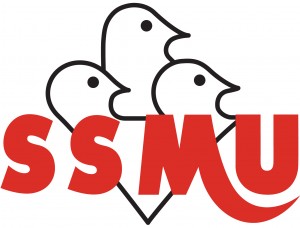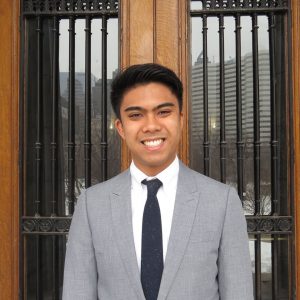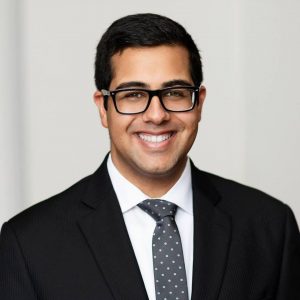Bryan Buraga
By Maya Abramson
Presidential candidate Bryan Buraga is a second-year student in the Faculty of Arts and Science, studying economics. This year he is the Arts and Science Senator for the SSMU and Chair of the SSMU’s Ad-Hoc Fall Reading Break Committee.
Buraga’s platform is made up of five main components: working toward student advocacy, financial and institutional reform, student space renewal, measures for accountability and transparency, as well as the improvement of support services for students. Concerning his work advocating for a fall reading break, Buraga told The Bull & Bear that it is “so close I can taste it,” and his platform includes a plan to have a break implemented by Fall 2020.
Buraga emphasized that improving communications between the SSMU and the student body is one of his top priorities. He expressed interest in holding bi-weekly events over Facebook Live in order to connect the SSMU President with McGill students and allow them to ask questions of the SSMU executives. Buraga also proposed a new office for communications within the SSMU, which he described as “an office [that would be] dedicated to improving our communications with students, and having a dedicated support staff to further that cause.”
Buraga expressed concerns about the SSMU’s reputation within the student body. He lamented that “everybody hears all about the bad stuff, but never about the good stuff.” Buraga, if elected, plans to put greater emphasis on things that the SSMU is working towards that are important to students, like a fall reading break and increased support for survivors of sexual violence. He expressed a desire to shift the culture of SSMU executives toward one that is “proactive about communicating with the student body – reaching out to them, meeting where they are.” He expressed this shift as an important precursor to increasing student engagement and voter turnout within McGill.
Buraga has learned valuable lessons from his past involvement with student politics at McGill, through both successes and failures. From a failed motion to introduce a legal defense fund, and an unsuccessful case brought against SSMU’s Judicial Board, Buraga says he learned the importance of properly communicating and refining his initiatives. “Not all of my ideas necessarily will be … passed just because I thought they were good ideas,” he said. He also described learning from these situations in saying that “institutions aren’t always set up to be fair or equitable.”
Concerning his extensive platform, Buraga expressed a commitment to creating ambitious goals. “All of these were created after consultations with many students about different issues they have,” he said, “no matter how feasible it is to put all of these things out there, showing that we have solutions … I think goes a long way.”
Buraga told The Bull & Bear that the leaders he admires tend to “listen more than talk, ” and are able to “gather people’s ideas and try to coalesce them.” He also expressed the importance of empathy for any member of student government. He explained that he was motivated to run for President by the opportunity to “use the position … to further a certain campus culture … where students feel comfortable and represented by their student union.”
Kyle Rubenok
By Andie Habert
Kyle Rubenok is a U3 Computer Science student in the Faculty of Arts. Currently a Member-at-Large of the SSMU Board of Directors, Rubenok was motivated to run for office after witnessing the positive change that effective student governance has had on students. During his time at McGill, he has been involved with numerous clubs, services, and department associations, getting to know the McGill community through his various leadership roles. Kyle Rubenok seeks to utilize this leadership experience to reform the SSMU, which he hopes to achieve via his three-pronged platform.
Rubenok’s platform prioritizes improving the student experience on campus, fighting for a higher standard of health and wellness, and forming transparent and responsible governance.
When asked about his priorities, he emphasized the importance of creating a long-term plan for the university. While this has been recently discussed via the implementation of an SSMU base fee increase, Rubenok’s plans to create “institutional memory” to ensure greater year-to-year continuity would allow for smoother transitions and the implementation of plans for “growth beyond the next election cycle.” Key elements of this plan include looking towards long-term policy decisions for the SSMU, advocating for a fall reading week, improving food service on the West side of campus, and increasing the number of permanent staff members working for the SSMU.
In addition to a long-term plan for the student society, Rubenok hopes to create a more cohesive involvement restriction policy to unilaterally ban students who have committed “egregious” offenses during certain school events, such as Frosh week and Carnival, from participating in similar events in other faculties. With this policy, Rubenok aims to create a safer campus environment, which he hopes to propagate by applying such ban to smaller faculty bars like BDA, 4 à 7, and Blues Pub.
Rubenok is also concerned with the lack of student awareness and involvement in SSMU services and engagements. He hopes to communicate these opportunities and expand their influence in a multitude of ways. This would include the creation of a public relations coordinator to work alongside the VP internal. As listservs often go unread, this position would better communicate the day-to-day work of the executives. Rubenok also seeks to reform the execution of General Assemblies. With his background in technology and experience working at TVM, Rubenok hopes to implement higher live-stream quality and an at-home voting system to increase engagement and combat low turnout during GAs.
In terms of how he stands out amongst other candidates, Rubenok believes that his experience working outside of McGill in the private sector, as well as founding his own technology start-up, has provided him with the knowledge and experience necessary to effectively lead the 2019-2020 SSMU executive team. His dedication to improving the student experience, increasing the presence and functionality of the SSMU, and implementing a long-term plan define the key elements of Kyle Rubenok’s presidential campaign.
Sam Haward
By Rose Bostwick
Sam Haward is a U2 Honours Economics and Political Science student. Originally from England and raised in the United States, Haward has been involved in SSMU since the end of his first year, when he took on the position counting and collecting placards after Legislative Council meetings. Since then, he’s climbed up the ladder, taking on an extensive list of positions.
Now, he’s running to be VP Finance on a platform that includes easing processes of club banking, hiring student support staff and financially rewarding clubs in good standing at the end of the year, fixing the club surplus of $400,000, reforming the Finance Committee, creating accessible financial reports, and republishing the “Where is my Money Going” document to include fees passed during the fall referendum period.
According to Haward, “What motivated me to run this year was that I saw that a lot of the issues that affected clubs and services were the same issues every year.”
As an international student himself, Haward will prioritize a plan to reform McGill’s international student health insurance coverage by reforming the Health and Dental Committee and partially or completely replacing Blue Cross health insurance with Studentcare in order to save international students’ money. He also emphasized managing the $400,000 services surplus by “[setting] this aside into a restricted fund to budget future capital expenditures, creating institutional memory for service executives, and allowing them to have money set aside already.”
Today, Haward is the Parliamentarian, Chair of the Accountability, Chair of the Nominating Committees, a non-voting member of legislative council, and a member of five SSMU committees including the Finance Committee and the Comprehensive Governance Review Committee.
“I can fix issues that have existed for years due to a lack of institutional memory and annual executive turnover,” Haward explained. “I could provide that link between [different] years and fill that gap with my experience in both governance and in finance.”
Haward explained his frustration at repeatedly seeing club executives struggling with bureaucratic tasks, such as submitting requests for insurance and claims, during his time working at SSMU. He believes that he could fix many of these issues through the institutional memory facets of his platform, such as improving transparency and adding support staff, rewarding clubs in good financial standing at the end of the year, and straightforward, understanding communication.
According to Haward, an important aspect of the VP Finance role is ensuring compliance, as clubs must follow strict regulations because SSMU is entirely funded by student fees. As a leader, Haward emphasized the importance of “the ability to be patient, to listen, [and] to make people understand that their concerns are being heard.”
When asked what aspect of leadership he admires, Haward pointed to “the ability to put others first,” explaining that, “A lot of people don’t do these jobs for their own sake, but because they want to make a difference.”
On which personal quality of his would make him a good leader, Haward emphasized his ability to empathize. “If you’re the exec of a club and you can’t access your money, it may not be a big deal to 99% of people on campus, but it is to you… It’s very hard when you’re a club and you want to run an event to get a very impersonal email that says, ‘You haven’t filled out this form, so you can’t run this event,’” Haward explained. “I think I can take a step back, explain, and have a more personable discussion rather than coming down on clubs like a ton of bricks.”
Ahmed Bawany
By Jacob Creskoff
Ahmed Bawany is a first-year bioengineering student running for the position of VP Finance. He has financial experience working as the Chief Financial Officer of Nixor Hospital as well as working as an intern in financial analysis. Bawany does not have formal experience working in SSMU, but hopes to bring his experience working for other groups with him.
Bawany’s platform highlights several points including efficient use of money, accountability, surplus fund use, enhancing institutional memory, and departmental infrastructure. He stressed the importance of enhancing institutional memory in the SSMU Finance Department, which he wants to accomplish through digitization of records as well as increased training by the outgoing VP Finance for the incoming VP Finance. Bawany hopes to expand the size of the finance department, and bring about a referendum on the question of SSMU’s excess service funds to determine their use.
Bawany cited his love for finance and desire to help people on scholarship. He went on to say: “I want to clean [this] mess…the previous VP Finance has told me that [the SSMU finances are] a mess.” Bawany expressed his view that under the current system, there is a threat of fraud and corruption from SSMU clubs, as well as his opinion that clubs are not audited enough. Not wanting any “leakage of funds,” Bawany stressed the importance of eliminating any potential fraud through rigorous SSMU audits and increasing the number of SSMU auditors.
When asked what distinguishes him from the other two candidates, Bawany said that he is ambitious, mature, and has “outside experience.” A self-described lover of Brooklyn-99 and “dressing well,” Bawany stresses that he would prioritize increasing efficiency by expanding the number of sub-departments and hiring more people. He also says that it is not necessary to increase the student services fee under the Master Plan. “I believe that students are already paying [too] much…if we first audit and [then] better manage the system…then we can know whether we should increase [the fee] or not.”
Ashar Yahya
By Rose Bostwick
Ashar Yahya is a U2 student, studying Economics and Finance. As VP Finance, Yahya would use the general club surplus fund, ease the process of applying for SSMU funding by hiring more staff, and build faculty relationships between SSMU and organizations such as faculty societies.
With regards to the surplus fund, Yahya plans to appoint SSMU representatives to each club to increase club accountability and transparency. Additionally, he plans to create an application tracker “so that clubs would be aware of what stage of the decision-making process they are at…[and] not have to follow up with SSMU directly,” as well as moving the application deadline to after exams. Furthermore, Yahya wants to work on improving the website Docuum, which contains thousands of past McGill exams and resources, and make the process of booking tables for food sales more convenient by allowing for “student associations [to] keep control of bookings for faculty clubs.”
Yahya does not have experience within SSMU, but he has held leadership positions in clubs that frequently interact with SSMU. Some of these roles include VP Finance of the McGill Students Actuarial Association, VP Events for the McGill Tennis Clubs, VP Sponsorships for the Foundation for International Medical Relief for Children, and VP Equity for Solin Hall Council last year. In addition to his experience in clubs, Yahya loves to play cricket.
Yahya was born in the US, moved to Toronto, and eventually Dubai, before coming to McGill. Attending high school in Dubai, he began his experience in leadership roles and in dealing with bureaucratic organizations, which he emphasized as an important part of his motivation in his campaign for VP Finance. “One of my main motivations for applying was that the difficulties we face in the clubs I am a part of are similar to the ones that other clubs face as well.”
Some of the issues Yahya has dealt with that have directly involved the SSMU include a long waiting period and a lack of transparency in the process of applying for funds, inconveniently scheduled auditing periods during finals week for club executives, and long wait times for samosa and bake sales, a significant source of revenue for many clubs. Therefore, the priority of his platform is helping “with the ease of doing business for clubs: to put less pressure on the funding committee and “reinvesting the funds [that] ultimately, all students pay for.” Advocating a “centralized system” of booking, he said, “Since there are over 230 clubs, one of the biggest roles [of the VP Finance]… is helping them, because they’re all based on student interests that students pay the base fee for.”
Citing his first-hand experience in his roles outside the organization as an asset, Yahya said, “Something that my competitors probably lack is…[knowledge of] the issues that clubs face on a day-to-day basis.”
Yahya believes that his passion for “charitable and social roles” would be an asset in the role of the VP Finance. Yahya said, “SSMU invests in ethics and that motivation of mine would definitely come through.”
Sanchi Bhalla
By Madison Brek
Sanchi Bhalla is a second-year business student. She has prior SSMU experience, having worked closely with the VP Finance throughout this semester, and has also written for the opinion section of The McGill Tribune. According to Bhalla, her priority is “inclusivity and involvement.” She plans to encourage interfaculty-cooperation, promote SSMU involvement to first-year students, and make frosh more inclusive for everyone (including those that don’t drink).
Bhalla hopes to increase the frequency of social events at McGill by creating ones that don’t require such large budgets and which are less exhausting for participants. “I know that a lot of people feel excluded on campus, and feel like they don’t have a way to develop a social circle if they didn’t do something like frosh. I want people to be able to make connections that last,” Bhalla explained. If elected, she hopes to encourage a sense of a unified McGill identity, rather than what she believes is currently popular on campus: faculty-specific bonding. Bhalla hopes to encourage people to get out of their immediate social circles.
Bhalla was motivated to run when she began working in student government and came to understand how much influence SSMU has on campus life. “I wanted to run when I saw how motivated everyone [at SSMU] is to making McGill a better place to be for students.”
Bhalla feels that her experience in the SSMU finance office makes her well-suited for the position of VP Internal, explaining, “I know how the exact bureaucratic procedures work. Problems often come up when there’s a lack of communication between the VP Internal and the VP Finance, and I genuinely feel like because I know what’s on the other side of it, I will plan events better.”
Bhalla also has plans to make her SSMU listserv emails very interactive, and promises they’ll never be dry. Her platform also includes plans to create more cooperation between faculty bars such as BdA and Blue’s Pub, and she would also like to introduce a campus-wide McGill calendar that would allow all students to become more involved in any and all McGill events.
Bhalla is coming into the election “with honest expectations” about what she’ll be able to accomplish if she’s voted into the position. She told The Bull & Bear that she has “spoken to the current VP Internal about what went wrong with his plans,” and explained that since she knows what can and cannot be done in student government, and has a solid platform and intricate knowledge of the SSMU bureaucracy, that she’ll be able to be very productive if elected.
Aandie Jacob
By Maya Abramson
Running for the VP Internal position is Aandriana (Aandie) Jacob, a U1 Arts student majoring in Political Science and Theatre. While she does not have any previous experience in the SSMU, she was the VP Events for her residence council in La Citadelle last year. Jacob told The Bull & Bear that this position helped her understand “how to stick to budget … how to target events to specific groups of people …[and] how to keep people interested in your event.” She expressed that the “role helped me understand a lot better the intricacies that go into event planning for a large community.”
In her free time, Jacob volunteers with the Montreal SPCA and fosters kittens with her roommates. She feels that the VP internal position would be a good fit for her, saying: “I’m a very determined individual … and because I’m so goal-oriented, this kind of work is the kind … I thrive on.”
Jacob expressed an interest in adapting some of the events currently included in frosh. She explained: “one of the main ideas of my platform is to push for better inclusivity, and I think that this should start with frosh, so that as students come to McGill they feel this atmosphere of inclusivity and acceptance.” Admitting that McGill’s faculty frosh events are very drinking-oriented, she suggested that the SSMU could provide alternative non-drinking options for any interested students. She told The Bull & Bear: “I want students who can’t drink or won’t drink to be able to attend their faculty froshes while still feeling comfortable.
Also in terms of event planning, Jacob was recently involved in staffing Faculty Olympics in order to better understand how it is implemented. After attending some of the events, she said: “I would really like to harness the intense competition of Faculty Olympics to better raise awareness for different things,” citing environmental issue awareness as an example.
The other main aspect of the VP Internal portfolio is communications. “Currently this is mainly done through the Listserv,” Jacob said, “but I would really like to expand that.” On top of the SSMU Listserv, she is interested in revamping and expanding the McGill app. If elected, she intends to “look into options for getting rid of the glitches and making it more of a one-stop shop for your McGill needs.” Jacob also brought up an idea proposed by the current VP Internal, Matthew McLaughlin, for the implementation of an online campus-wide calendar for all events, open to any faculty. Jacob explained that this “could be very well implemented into the McGill app as well.”
Jacob expressed a desire for the McGill community to get more involved with the SSMU. She believes that better communication can help solve problems that stem from the fact that there is “a lot of misinformation about what SSMU does and … a lot of the student body underestimates [it].”
Husayn Jamal
By Erica Sheffres
Husayn Jamal is a U2 Arts student studying political science and international development. Jamal is focused primarily on the necessity of governance reform within SSMU and the issues that stem from the current system. He began by acknowledging that “SSMU has a governance problem” which often discourages students from engaging with the SSMU. He strongly believes that fostering “long-term, sustainable engagement with students and with voters does have to come back to governance reform.”
One governance problem that Jamal wishes to change is the over-creation of committees. Student consultations often happen in the lower levels of chains of committees, but according to Jamal, student voices often do not filter back up to the Senate: “You start adding in the voices of administrators, and the voices of students get more and more diluted as you go up.” Jamal hopes that the Senate can start inviting students to share their ideas directly at Senate meetings so that student opinions on pertinent issues are included in reports rather than drowned out.
Another of Jamal’s potential governance reforms would include allowing students to bring their own motions to Legislative Council. Under the current system, students who want SSMU to advocate for specific causes or implement certain policy changes only have two options: approach their Counsel, which Jamal acknowledges can be uncomfortable and intimidating, or wait until the General Assembly to bring forward concerns. Jamal maintains that this option will make it easier for students to make changes that they want to see.
Jamal pointed out several of his unique qualities and experiences that make him an ideal candidate for the VP University Affairs role. These include sitting on the Governance Reform Committee since its inception in October 2018, as well as his long-term role as Speaker for SSMU, AUS, and SUS. Jamal states that his experience as Speaker has familiarized him with the intricacies of the SSMU governance system, provided him with consensus-building skills and patience, and helped him gain an understanding of SSMU’s unique structure and barriers to implementing changes.
He elaborated, “What sets me apart from my opponent is that I have an understanding of the internal structuring of SSMU and of our financial constraints that we’re facing.” Specifically, Jamal disagrees with his opponent in that he supports the SSMU base fee increase: “I maintain, and SSMU maintains as a whole, that mental health services are essential and should be paid for – they’re not [paid for] by the government or the university. So recognizing that SSMU has an obligation to step up, and I think that’s only possible with the base fee increase.”
Jamal also emphasized the importance of ensuring that SSMU members know how to engage with SSMU. He feels that it is important for SSMU to interact with students on the platforms where they feel most comfortable expressing concerns. One example of such platforms are McGill Reddit pages; he describes these as “really good places to solicit student feedback, constructive and otherwise”. He added that comments on these types of platforms should not be ignored, summarizing, “I think that SSMU should be doing a better job of actually taking that seriously and monitoring that. And if a student asks a question that we have the ability to answer, we absolutely should be doing that.”
Finally, Jamal believes that his previous involvement with education advocacy has given him the proper foundation to advocate for McGill students at the university level: “I want to try to transition back into the role of advocacy work, and the University Affairs portfolio is heavily involved in advocacy”. One of Jamal’s main advocacy goals is the issue of provincial government funding for students’ mental health. He emphasized that he wants to “push [the provincial government] to understand that mental health is not a secondary service, it is an essential service for students. It really does color how students go through the university experience”.
Madeline Wilson
By Gilli Cohen
Madeline Wilson is a third-year student in the Faculty of Arts, majoring in Political Science and minoring in Geography and Physics. The two cornerstones of Wilson’s campaign are concrete advocacy and academic accessibility. For the former, Wilson plans to amend the current system where various committees, organized by the administration, would represent student interests. Wilson stated that if working groups, ad hoc committees, and task forces struck by McGill were created with less than fifty percent student representation, she would create a shadow task force comprised entirely of students. This would represent the voices of McGill’s students, rather than using students as tokens, which Wilson explained to be the current nature of many task forces that she is part of currently.
Additionally, Wilson plans to update the current University Affairs website to enable what she referred to as “self-advocacy.” If elected, Wilson plans to create a more accessible database, where “individuals not necessarily well-versed in student politics could search topics such as sexual violence, mental health, or committees of interest and receive a list of documents immediately.”
Wilson’s plan for academic accessibility is grounded in the “Know Your Rights” campaign, which would make academic accommodation and course registration waitlist policies more accessible for students. The campaign also informs professors of the list of rights guaranteed to McGill students in the student constitution, which Wilson acknowledged would “inform the problem at its root.” When asked what specific mechanisms she would use to communicate these rights to professors, she listed ideas such as email blasts to professors regarding student rights and the mandatory inclusion of student rights’ by top faculty administrators in the orientation sessions which all departmental professors attend.
When asked what motivated Wilson to run for this position she said that, “although it sounds cliche, I genuinely care about students’ needs.” She stated that through her current work as Arts Senator, she has gained the skills necessary to navigate the bureaucracy of the McGill administration. Wilson also highlighted the fact that there is still room to grow with respect to the different avenues of student advocacy. She stressed that as VP University Affairs, she would be able to centralize these avenues to help McGill’s student body.
Wilson stated that her foundational experience as Arts Senator, as well as her ability to address student discontent, would yield a more favourable case to be next year’s VP University Affairs. Wilson concluded by stating that she is extremely excited to run for this position: “It is a role I’ve looked up to for the past three years, and a role that has inspired me to be the best advocate I could be during my time at McGill.”
Adam Gwiazda-Amsel
By Theo Malhotra
Running unopposed for the position of VP External is Adam Gwiazda-Amsel, a U2 Arts student studying Philosophy and Economics. Gwiazda-Amsel’s platform focuses on emphasizing administrative continuity within the SSMU and reconciling cleavages between McGill and the province.
Though he recognizes that he possesses certain privileges, Gwiazda-Amsel stated that he lacks the economic privilege to be extensively involved at McGill due to having worked for the past six years. He has been a manager at Starbucks for the last two years, participating in community outreach, including serving hot meals at a local homeless shelter. Additionally, Gwiazda-Amsel has participated in workshops on parliamentary committees centred on navigating Quebec politics and has worked with HeForShe at McGill to advance gender equality. Gwiazda-Amsel has hosted weekly board game nights for three continuous years and is a board game fanatic. He told The Bull & Bear: “I love board games. I, like, love board games.”
Gwiazda-Amsel aims to improve SSMU’s internal consistency by continuing the projects that VP Externals undertake and which may take multiple years to execute, despite the one-year term commitment of the position. He argues that policies proposed within the SSMU, using Change the Name as an example, often get “lost in the background” due to the ever-changing SSMU executives. To avoid this, Gwiazda-Amsel intends to engage with advocates of various representative groups on campus to understand how the SSMU can better serve them. Gwiazda-Amsel promises to enhance recent improvements in accessibility for student organizations within the SSMU, including serious efforts to connect with newspapers and other student press to foster transparency.
On continuity, Gwiazda-Amsel aims to consolidate SSMU history to maintain one set of documents that present a “living memory of the SSMU.” He argues that in the past, different motions have often “float[ed] one way or another,” and views this project as groundwork for future SSMU executives, so that they may avoid meticulously studying previous SSMU legislation when first elected
Gwiazda-Amsel describes himself as “mostly running on” the disassociation between the Montreal and McGill community, aiming to improve the University’s community outreach. Viewing it as a feasible, one-year project, Gwiazda-Amsel wants to “Montrealize the University” with opportunities for McGill students to immerse themselves in Montreal culture beyond the Ghetto or Plateau. Gwiazda-Amsel believes that he can help by connecting out-of-province and international students with the Montreal-based organizations that he has some familiarity with, helping to bridge the campus divide.
A Montreal native himself, Gwiazda-Amsel aims to reduce the divide between Montreal and non-local students so that “Montrealers can actually engage in McGill.” While recognizing the efforts of the OCC (Off-Campus Connects), Gwiazda-Amsel advocates for the creation of a student-led organization, akin to Frosh, to showcase the resources and activities McGill has to offer Montrealers.
Gwiazda-Amsel aims to engage McGill with other Quebec universities, hoping to participate in student unions of inter-university representative bodies in Quebec, which he notes was previously attempted “with no success.” While most of these organizations, including the AVEQ (Association for the Voice of Education in Quebec), have been weakened by a chronic lack of participation, Gwiazda-Amsel maintains that McGill’s influence in protecting student rights specifically is greatly enhanced within a collective that engages with a parliamentary committee. Gwiazda-Amsel cited the success of the Red Square Movement, where thousands of Quebec students protested against a large tuition raise across Quebec, to the widespread nature of the protests across the province.
[tabby title=”VP Student Life”]Billy Kawasaki
The candidate was only available for an interview on Wednesday, and the profile will be updated accordingly.
[tabbyending]














